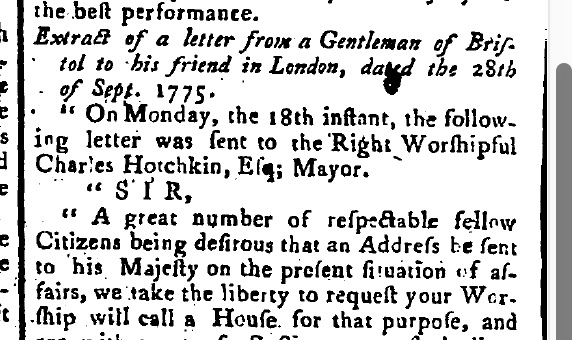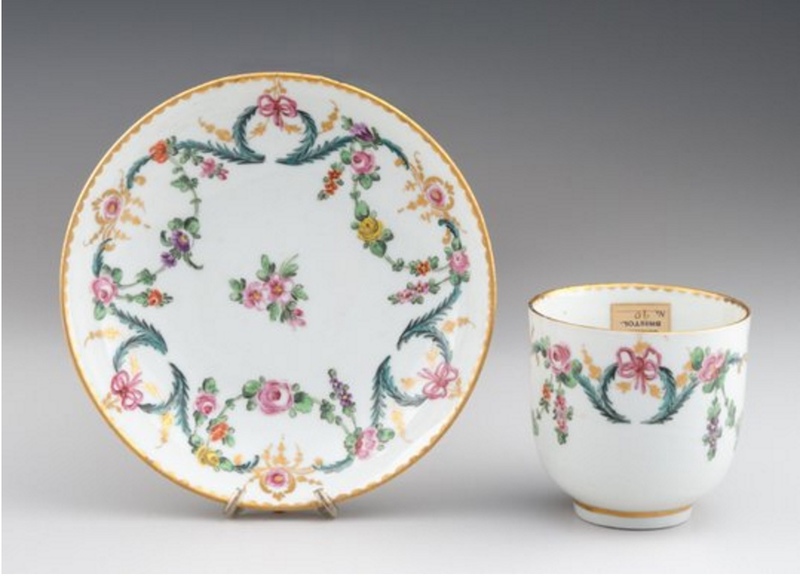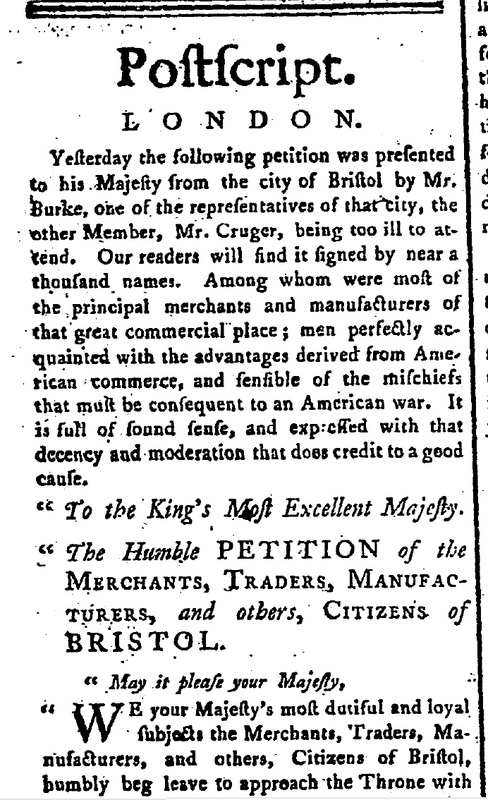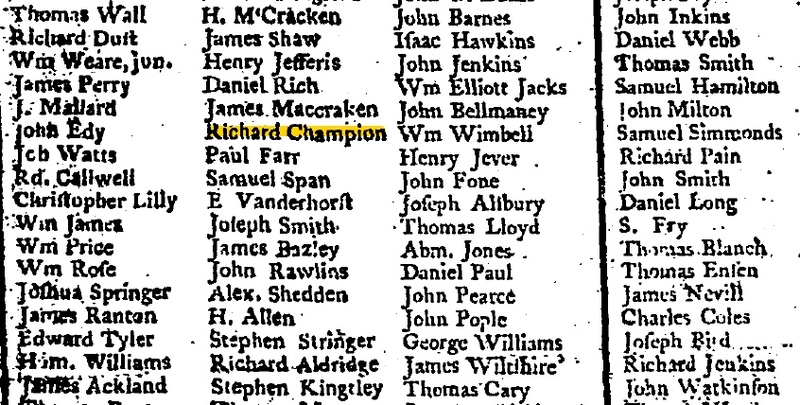Person: Richard Champion and Political Action among Merchants and Manufacturers



 http://dighist.fas.harvard.edu/courses/2017/hist1002/files/original/5714227b345e7379b3b92d3302ce3f9f.pdf
http://dighist.fas.harvard.edu/courses/2017/hist1002/files/original/5714227b345e7379b3b92d3302ce3f9f.pdf On Monday May 29, 1775, the Chester Chronicle of Chester, England, offered its readers a notice of Parliament’s reassignment of a patent from William Cookworthy of Plymouth to Richard Champion of Bristol “for the sole use and exercise of a discovery of certain materials for making porcelain.” In the same column, the Chronicle contained a transcript of King George III’s remarks to Parliament on the previous Friday concerning the ongoing American crisis, primarily focused on his gratitude for their “firm and steady resolution” to maintain royal and parliamentary authority in the colonies, especially regarding Britain’s “commercial interests.” Though the king noted his “concern” at the necessity of growing his army and navy in response to American unrest, he also firmly asserted that “Nothing on [his] part […] shall be wanting to secure the public tranquility.” Just three months later, the king would answer last-minute overtures of peace from the Continental Congress with an angry Proclamation of Rebellion and turn toward war, but for now he encouraged both Parliament and readers of the Chester Chronicle to have “great reason to expect the continuance of peace.”[1] The Chronicle’s adjacent notice about Richard Champion’s new porcelain patent might seem wholly unremarkable in comparison, but the very mundanity of its presence signals the everyday feeling of public debates about colonial unrest and the eventual war. The king’s emphasis on “commercial interests” of the conflict also points toward the issue that ultimately drew manufacturers like Champion into the political fray. Throughout 1775, as the king moved from assurances of peace to declarations for war, Champion and others like him took to the newspapers themselves, engaging with both political leadership and the public to voice their opinions and stress the economic importance of their American ties. Their debate entered the common fabric of life in port cities like Bristol, where a city’s merchant character inevitably tied it to political discourse.
Richard Champion was born to a merchant family in Bristol in 1743, beginning his own trading business in 1767 with a focus on Charles Town, South Carolina. By 1770 he was one of Bristol’s most prominent merchants, with ties to Canada, America, the West Indies, and Europe. Champion was a visible player in Bristol municipal life, serving at various times as treasurer of the infirmary, warden of the Society of Merchant Ventures, and a founding member of the Bristol Library Society. In 1774, he played a major part in the election of Edmund Burke as MP for Bristol, and throughout the revolutionary era his trade and family ties to South Carolina helped keep Burke and other leading Whigs informed about American feelings.[2] Such a position would have allowed Champion to see the conflict in 1775 from two sides: as a fairly public figure in English society and government, he would have cared about in his country’s wellbeing and image abroad; as a Bristol merchant his economic investments at home and abroad might have overridden pride in king or empire.
On October 3, 1775, London’s Morning Chronicle reprinted a letter sent from Bristol to London recounting an appeal on September 25 from about fifty Bristol merchants, including Champion, who hoped “that the American Merchants, Traders, and Well-wishers to American Commerce” of Bristol might meet in the city’s guildhall “to consider of a Petition to his Majesty.” The movement toward writing a petition had apparently been public since at least September 12, a date referenced in the letter, and on September 28 the merchants made their “Address” to the mayor in a public forum “attended by the Sheriffs, many Members of the Corporation, and the greatest number of respectable Citizens.”[3] Private citizens like Champion thus felt licensed to carry on their political discussions in front of wide audiences, in person and in print, over periods of weeks. In fact, the exact article that appears in this London newspaper is reprinted in the “Bristol, September 30” update of the December 23, 1775, issue of the Pennsylvania Ledger, a Philadelphia newspaper—the conversation carried on months later all the way across the Atlantic.[4, 5]
The conversation pushed further toward public action on October 10, 1775, just a week after the Morning Chronicle’s notice, when the London Evening Post reprinted a petition sent from Champion and almost 1000 other Bristol merchants to the king on behalf of American sympathizers. The petition, presented by the same Edmund Burke who Champion had helped win the MP election one year previously, underlined mercantile concern that even military victory could result in alienated markets, a negative outcome for Britain. Arguing that among the signers “were most of the principal merchants and manufacturers of that great commercial place; men perfectly acquainted with the advantages derived from American commerce, and sensible of the mischiefs that must be consequent to an American war,” the petitioners noted, “we behold the growing distractions in America threaten, unless prevented by the timely interposition of your Majesty's wisdom and goodness, nothing less than a lasting and ruinous civil war.”[6] Though not explicitly against military intervention, the petition delicately implied that drawn-out civil war would be worse for Britain than an immediate move toward peace—it does not specify whether reconciliation or permanent severance would be preferable. The signers’ emphasis on Bristol’s close economic ties to America through 1774 and their reliance on both American imports and exports pointed toward the possibility of developing an economic partnership even without imperial unity. The perspective here and in the Morning Chronicle hints that for Champion and his like, America was considered proximate and accessible via trade, but not necessarily an extension of England’s political body. Because of their American connections, Bristol’s merchant class seems to have perceived itself as well-positioned to gain the king’s attention—even an authority whose expertise should be consulted. Through newspapers at home and abroad, Richard Champion and others like him sought to push the course of war in a direction economically favorable to their bustling city.
The war carried on for several long years after Champion’s name appeared in the newspapers of 1775 arguing for a quick resolution. After briefly serving as paymaster-general of his majesty’s forces in 1782, a shift in British government cost Champion his post and hopes of becoming consul-general to North America.[7] His name disappeared from British newspapers as he apparently lost either interest or import in the political conversation. In 1784, the Champion family emigrated to South Carolina, naturalizing in 1787. In the last years of his life Champion apparently reinvigorated his interest in global politics, publishing two pamphlets entitled “Comparative reflections on the past and present political, commercial, and civil state of Great Britain” (1787) and “Considerations on the present situation of Great Britain and the United States of North America, with a view to their future commercial connections” (1784), again drawing on his expertise as a Bristol merchant.[8, 9] Both pamphlets appeared in general circulation in London, an echo of their author’s previous involvement in public forums and printed discourse.
Champion’s voice and name ultimately receded almost entirely from the memories of the American Revolution, his signature on Bristol’s petitions and his two pamphlets probably having no historical impact. The traces he left behind serve rather as, firstly, notice of the war’s import for an average merchant and manufacturer living across the Atlantic from the fighting, and secondly, evidence that at least from Bristol’s own point of view, its voice was crucial for directing the movement of world history.
[1234 words]
[1] Chester Chronicle or Commercial Intelligencer (Chester, England), Monday, May 29, 1775; Issue 5. 17th-18th Century Burney Collection Newspapers.
[2] Walton, Karin M. “Champion, Richard (1743–1791).” Karin M. Walton In Oxford Dictionary of National Biography, edited by H. C. G. Matthew and Brian Harrison. Oxford: OUP, 2004. Online ed., edited by David Cannadine, September 2013. http://www.oxforddnb.com.ezp-prod1.hul.harvard.edu/view/article/5094 (accessed March 20, 2017).
[3] Morning Chronicle and London Advertiser (London, England), Tuesday, October 3, 1775; Issue 1986. 17th-18th Century Burney Collection Newspapers.
[4] Pennsylvania Ledger (Philadelphia, Pennsylvania), December 23, 1775; Issue 48. America's Historical Newspapers.
[5] The page of the newspaper on which this letter appears also contextualizes the public debate globally: reports of British troop movements in colonies as diverse as Ireland, Massachusetts, and Jamaica are recorded, as well as American efforts to grow its navy “to the great annoyance of the English ships of war.” The economic and political conflicts are equally far-reaching: there are complaints about the loss of American commerce to the French and Dutch, and “alarming news” comes from Ireland that conscripted officers and soldiers refuse to take up arms. The newspaper continues to see America as part of Britain, describing a “skirmish between the Parliament troops and the Provincials” on August 27 and including an opinion piece about naval battles in America that warns, “English sailors, opposed to their natural foes of France and Spain, will ever be great; but Englishmen, opposed to Englishmen, will find victories dear bought honours”—but among these assumptions of unity, the voice of Champion and his fellow Bristol merchants questions the presumption that England’s greatest asset is control of her American colonies.
[6] London Evening Post (London, England), October 10, 1775 - October 12, 1775; Issue 8356. 17th-18th Century Burney Collection Newspapers.
[7] Walton, Karin M. “Champion, Richard (1743–1791).” Karin M. Walton In Oxford Dictionary of National Biography, edited by H. C. G. Matthew and Brian Harrison. Oxford: OUP, 2004. Online ed., edited by David Cannadine, September 2013. http://www.oxforddnb.com.ezp-prod1.hul.harvard.edu/view/article/5094 (accessed March 20, 2017).
[8] Champion, Richard. Comparative reflections on the past and present political, commercial, and civil state of Great Britain; with some thoughts concerning emigration. London, 1787. The Making Of The Modern World. Web. 20 Mar. 2017.
[9] Champion, Richard. Considerations on the present situation of Great Britain and the United States of North America, with a view to their future commercial connections. London, 1784. The Making Of The Modern World. Web. 20 Mar. 2017.